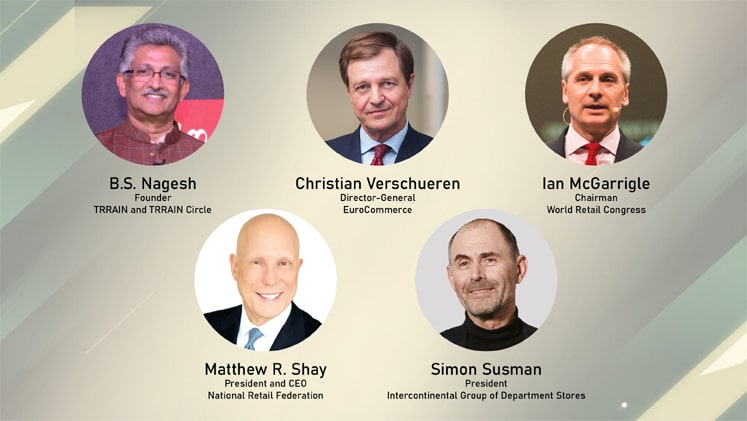Retailers Association of India (RAI), one of the most eminent organisations in the field of retail in India, has been on their toes, bringing together the stalwarts in the country and abroad to sound out the pulse of the industry right now. The third webinar in a series, focused on the impact of COVID-19, saw the collaboration of RAI with Trust for Retailers and Retail Associates of India (TRRAIN).
B.S. Nagesh, Founder of TRRAIN and TRRAIN Circle, moderated the webinar and the panellists in attendance were the who’s who of the industry from the world over, including Christian Verschueren, Director-General, EuroCommerce; Ian McGarrigle, Chairman, World Retail Congress; Matthew R. Shay, President and CEO, National Retail Federation; and Simon Susman, President, Intercontinental Group of Department Stores.
The current situation is one that has enraptured everyone in its throes and the retail industry has been hit harder than ever. The brands and retailers already struggling in the past year are left with nothing to bank on while others seem to be restructuring either their debt or the workforce to survive this crisis. The aim of the webinar was to bring to light the retail issues pertinent to the current situation at a world scale.
Effects on business
Globally, all retailers other than the ones deemed essential have faced store closures for over a month now. And, despite all efforts to reserve liquidity, experts are predicting for 30-40 per cent of the retailers in the wealthiest of countries to go bankrupt if the lockdowns were to continue.
As Matthew R. Shay puts it, “At the end of the day, the retailers with liquidity issues, high debt and low cash reserves may die out despite efforts because we aren’t able to get the economy open fast enough for them to get back on their feet.”
“The ones that do survive will end up absorbing the market share of those that couldn’t sustain themselves,” he added.
Even in India, results from a survey of 1,500 Indian retailers indicate that 20-25 per cent of retailers will not be able to survive even the next 3 months of closures.
However, the importance of preservation of cash is being emphasised over and over as the only means to ride out this pandemic. “Apparel businesses are facing intrinsic threat to survival, and survival is cash. At the end of this, we’re all going to have lesser customers and channels of retailing and buying will have changed. We need to do everything to save cash,” said Simon Susman, President, Intercontinental Group of Department Stores.
Another facet of this phase that can also be considered an opportunity is to consider how the businesses will be perceived post-lockdown. The panellists were of the opinion that the brands and retailers who show their care for the community and not just blatant capitalistic greed will have gained the trust of the consumer. The systems and processes that brands put in place with various degrees of success are what will remain in the minds of consumers.
A graver issue that has come to light is that of mid-level retailers. The smaller retailers can potentially expect help from the Government and the larger corporations can take care of themselves. Those in the middle are stuck with no backing or ability to help themselves.
Also Read: Fashion retail industry faces heavy losses, to pivot business models to stay afloat
Changes in consumer behaviour
At the beginning of the coronavirus outbreak, consumers had expressed that they would change the way they buy but the volume would likely remain the same. However, as the lockdowns have progressed, they have realised the importance of cash reserves in emergencies as such.
The next step was panic buying. People hoarded everything from food, skincare, groceries to toilet paper. The surge in demand was unprecedented. More and more consumers are turning to e-commerce portals which could have lasting effects. As Christian Verschueren pointed out, “Even though there has been a boost in e-commerce, it is not sufficient to fulfil the losses being endured by bricks-and-mortar stores.”
It is also being said that retailers do not have the right inventories. All e-commerce portals facing a surge of demand find themselves at the short end of the stick when it comes to essentials and systematic delivery channels. Most retailers are also grappling with the fact that they either have too many customers and not the right inventory or vice versa.
On the other hand, in Ian McGarrigle’s opinion, “Globalisation may become more localised.” The losses in a country like Italy due to lack of tourism may not be fully compensated by their own citizens, but as people are being encouraged to explore more of their own country, retailers may find solace in their own people.
An upside that has showcased the retail industry’s heart is in the right place, is the fact that non-essential retailers have offered their employees to the essential retailers facing staff shortages in India, Germany and the USA. It is a truly magnanimous step in the direction of helping furloughed employees as well as making sure essentials reach people without any hurdles.
Government support
Despite the fact that Governments globally are not only battling a health crisis but also deteriorating economies, there are many jobs being lost due to lockdowns. Matthew estimated a total of 12 million jobs being lost in retail over the next year if nothing is done to save them as more and more retailers go under.
There is, nonetheless, a huge difference in the way developed and developing nations are coping with the crisis. While India has not yet revealed any relief packages for this industry, Simon pointed out that nations like India and South Africa might not have the same kind of cash reserves as the US or European countries to be able to help the unemployed out.
Christian Verschueren explained the relief measures are being taken by various European nations that include tax deferrals, banks providing easy loans, relaxing Government-aid regulations and talking to landlords about the possible waiving of rents. Apart from this, Germany has been successful in implementing schemes for the unemployed. In fact, some countries are even helping companies out by paying up to 80 per cent of their employees’ salaries.
The assigning of products as essential and non-essential has also been widely debated. Restricting it to just food and pharmaceutical products is not prudent in the eyes of most retailers and they are calling Governments to reconsider other products in case lockdowns are extended.
The experts also agreed on the fact that to pull up demand at the lower-level post-lockdown, there was an imminent need for creating the right stimulus. The last week in America has been centred on strategies to open the economy back and to create the flow of demand as most retail bodies across the globe are asking Governments for a gradual opening up of non-food essential stores.
In conclusion, all experts were of the opinion that SMEs are going to be hit hard, and at this point, it depends on companies who are able to reserve cash and tide over this rough patch. Many jobs are going to be lost the world over, and although Governments are providing benefits to those who are unemployed, it might not be enough. Retailers are also going to suffer post-lockdown as channels of buying may change and all those who have invested in their brands and in helping the community will fare better than others who will be lost in obscurity due to insufficient cash reserves and high debt.
Also Read: How COVID-19 has affected retail business in East India







